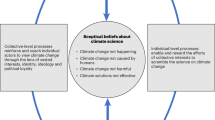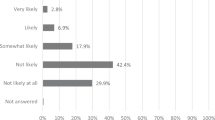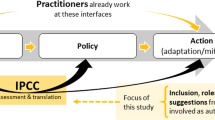Abstract
Policymakers involved in climate change negotiations are key users of climate science. It is therefore vital to understand how to communicate scientific information most effectively to this group1. We tested how a unique sample of policymakers and negotiators at the Paris COP21 conference update their beliefs on year 2100 global mean temperature increases in response to a statistical summary of climate models’ forecasts. We randomized the way information was provided across participants using three different formats similar to those used in Intergovernmental Panel on Climate Change reports2,3. In spite of having received all available relevant scientific information, policymakers adopted such information very conservatively, assigning it less weight than their own prior beliefs. However, providing individual model estimates in addition to the statistical range was more effective in mitigating such inertia. The experiment was repeated with a population of European MBA students who, despite starting from similar priors, reported conditional probabilities closer to the provided models’ forecasts than policymakers. There was also no effect of presentation format in the MBA sample. These results highlight the importance of testing visualization tools directly on the population of interest.
This is a preview of subscription content, access via your institution
Access options
Access Nature and 54 other Nature Portfolio journals
Get Nature+, our best-value online-access subscription
$29.99 / 30 days
cancel any time
Subscribe to this journal
Receive 12 print issues and online access
$209.00 per year
only $17.42 per issue
Buy this article
- Purchase on Springer Link
- Instant access to full article PDF
Prices may be subject to local taxes which are calculated during checkout




Similar content being viewed by others
Change history
02 March 2017
In the version of this Letter originally published, references 3 and 19 contained errors in the author names. These errors have been corrected after print.
References
Budescu, D. V., Por, H.-H., Broomell, S. B. & Smithson, M. The interpretation of IPCC probabilistic statements around the world. Nat. Clim. Change 4, 508–512 (2014).
Pachauri, R. K. & Meyer, L. A. Climate Change 2014: Synthesis Report (IPCC, Cambridge Univ. Press, 2014).
McMahon, R., Stauacher, M. & Knutti, R. The unseen uncertainties in climate change: reviewing comprehension of an IPCC scenario graph. Climatic Change 133, 141–154 (2015).
Patt, A. G. & Weber, E. U. Perceptions and communication strategies for the many uncertainties relevant for climate policy. Wiley Interdiscip. Rev. Clim. Change 5, 219–232 (2014).
Riahi, K. et al. The shared socioeconomic pathways and their energy, land use, and greenhouse gas emissions implications: an overview. Glob. Environ. Change http://dx.doi.org/10.1016/j.gloenvcha.2016.05.009 (2016).
Taylor, K. E., Stouffer, R. J. & Meehl, G. A. An overview of CMIP5 and the experiment design. Bull. Am. Meteorol. Soc. 93, 485–498 (2011).
Abdellaoui, M., Baillon, A., Placido, L. & Wakker, P. P. The rich domain of uncertainty: source functions and their experimental implementation. Am. Econ. Rev. 101, 695–723 (2011).
Dieckmann, N. F., Peters, E. & Gregory, R. Seeing what you want to see: how imprecise uncertainty ranges enhance motivated cognition. Risk Anal. http://dx.doi.org/10.1111/risa.12639 (2016).
Cooke, R. M. Messaging climate change uncertainty. Nat. Clim. Change 5, 8–10 (2015).
Pidgeon, N. & Fischhoff, B. The role of social and decision sciences in communicating uncertain climate risks. Nat. Clim. Change 1, 35–41 (2011).
Fischhoff, B. & Davis, A. L. Communicating scientific uncertainty. Proc. Natl Acad. Sci. USA 111, 13664–13671 (2014).
Feller, W. An Introduction to Probability Theory and its Applications (John Wiley, 1968).
Synthesis Report on the Aggregate Effect of the Intended Nationally Determined Contributions FCCC/CP/2015/7 (UNFCCC, 2015); http://unfccc.int/resource/docs/2015/cop21/eng/07.pdf
Climate Scorecard (Climate Interactive, Accessed 12 December 2016); https://www.climateinteractive.org/programs/scoreboard
Budescu, D. V., Por, H.-H. & Broomell, S. B. Effective communication of uncertainty in the IPCC reports. Climatic Change 113, 181–200 (2011).
Bonaccio, S. & Dalal, R. S. Advice taking and decision-making: an integrative literature review, and implications for the organizational sciences. Organ. Behav. Hum. Decis. Process. 101, 127–151 (2006).
See, K. E., Morrison, E. W., Rothman, N. B. & Soll, J. B. The detrimental effects of power on confidence, advice taking, and accuracy. Organ. Behav. Hum. Decis. Process. 116, 272–285 (2011).
Tost, L. P., Gino, F. & Larrick, R. P. Power, competitiveness, and advice taking: Why the powerful don’t listen. Organ. Behav. Hum. Decis. Process. 117, 53–65 (2012).
Knutti, R., Furrer, R., Tebaldi, C., Cermak, J. & Meehl, G. A. Challenges in combining projections from multiple climate models. J. Clim. 23, 2739–2758 (2010).
Prewitt, K. et al. Using Science as Evidence in Public Policy (National Academies, 2012).
Epley, N. & Gilovich, T. Putting adjustment back in the anchoring and adjustment heuristic: differential processing of self-generated and experimenter-provided anchors. Psychol. Sci. 12, 391–396 (2001).
Kunreuther, H. et al. in Climate Change 2014: Mitigation of Climate Change (eds Edenhofer, O. et al.) (IPCC, Cambridge Univ. Press, 2014).
Harrison, G. W. & List, J. A. Field experiments. J. Econ. Lit. 42, 1009–1055 (2004).
IPCC Climate Change: 2013 The Physical Science Basis (Cambridge Univ. Press, 2013).
Zellner, A. An efficient method of estimating seemingly unrelated regressions and tests for aggregation bias. J. Am. Stat. Assoc. 57, 348–368 (1962).
Tversky, A. & Koehler, D. J. Support theory: a nonextensional representation of subjective probability. Psychol. Rev. 101, 547–567 (1994).
Redelmeier, D. A., Koehler, D. J., Liberman, V. & Tversky, A. Probability judgment in medicine discounting unspecified possibilities. Med. Decis. Mak. 15, 227–230 (1995).
Fox, C. R. & Birke, R. Forecasting trial outcomes: lawyers assign higher probability to possibilities that are described in greater detail. Law Hum. Behav. 26, 159–173 (2002).
Fox, C. R., Rogers, B. A. & Tversky, A. Options traders exhibit subadditive decision weights. J. Risk Uncertain. 13, 5–17 (1996).
Fox, C. R. & Rottenstreich, Y. Partition priming in judgment under uncertainty. Psychol. Sci. 14, 195–200 (2003).
Acknowledgements
The research leading to these results received funding from the European Research Council through the two projects ERC-2013-StG no. 336703 RISICO and ERC-2013-StG no. 336155 COBHAM. We thank all respondents who took the time and effort to undertake the survey both at COP21 in Paris and at the Climate Change Strategy Role Play held through CEMS—The Global Alliance in Management Education.
Author information
Authors and Affiliations
Contributions
All authors were involved in planning the research and designing the experiments. V.B., E.W., L.B. and M.T. carried out the experiment. V.B., M.T. and N.L. analysed the results. All authors contributed to the writing of the paper.
Corresponding author
Ethics declarations
Competing interests
The authors declare no competing financial interests.
Supplementary information
Supplementary Information
Supplementary Information (PDF 1102 kb)
Supplementary Information
Supplementary Information (XLSX 199 kb)
Supplementary Information
Supplementary Information (XLSX 199 kb)
Supplementary Information
Supplementary Information (XLSX 188 kb)
Rights and permissions
About this article
Cite this article
Bosetti, V., Weber, E., Berger, L. et al. COP21 climate negotiators’ responses to climate model forecasts. Nature Clim Change 7, 185–190 (2017). https://doi.org/10.1038/nclimate3208
Received:
Accepted:
Published:
Issue Date:
DOI: https://doi.org/10.1038/nclimate3208
This article is cited by
-
Improving figures for climate change communications: Insights from interviews with international policymakers and practitioners
Climatic Change (2024)
-
Public trust, perceived accuracy, perceived likelihood, and concern on multi-model climate projections communicated with different formats
Mitigation and Adaptation Strategies for Global Change (2021)
-
Co-designing engaging and accessible data visualisations: a case study of the IPCC reports
Climatic Change (2021)
-
Communication of IPCC visuals: IPCC authors’ views and assessments of visual complexity
Climatic Change (2020)
-
Model Uncertainty in Climate Change Economics: A Review and Proposed Framework for Future Research
Environmental and Resource Economics (2020)



